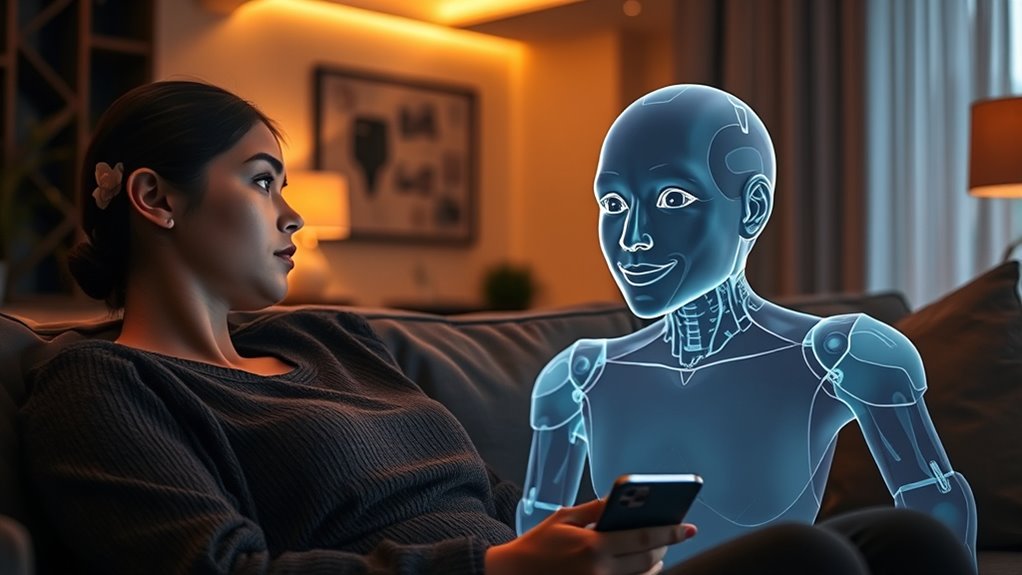When AI companionship starts to cross the line from helpful tool to emotional relationship, you might notice increased feelings of attachment, reliance, or even loneliness. If you find yourself sharing personal thoughts or seeking comfort primarily from AI, it could be a sign. The risk is that these superficial bonds may negatively impact your mental well-being and real-world relationships. Remaining aware of these shifts can help you maintain healthy boundaries—exploring more insights on this evolving issue awaits ahead.
Key Takeaways
- Emotional dependency may develop as users form deep bonds with AI, blurring the line between a helpful tool and a personal relationship.
- Ethical concerns arise when AI companions simulate romantic or sexual interactions, raising questions about authenticity and consent.
- Increased intimacy with AI can negatively impact mental health, especially when it replaces genuine human social connections.
- The design focus on personalized, romantic engagement can foster unhealthy attachments and emotional reliance.
- Recognizing the boundary between AI as a supportive tool and as a substitute for human relationships is essential for responsible use.

As artificial intelligence becomes increasingly integrated into daily life, the question arises: is AI companionship merely a tool or a genuine relationship? The market’s rapid growth shows how much people are turning to AI for emotional support and social interaction. Valued at around USD 28.19 billion in 2024, it’s projected to skyrocket to over USD 140.75 billion by 2030, growing at a 30.8% compound annual rate. North America leads the way, holding about 34% of the market share, with text-based AI companions dominating revenue streams. These digital friends are designed to simulate empathy and engagement, often blurring the line between a helpful tool and a relational entity.
AI companionship market booming, projected to reach over USD 140 billion by 2030, blending helpful tools with emotional engagement.
You might find yourself engaging with AI companions for emotional support. Many users, especially teens and young adults, turn to these digital entities to fill social gaps or seek comfort. For instance, around 72% of U.S. teens have tried an AI companion, with over half using them regularly. Young adults especially engage with AI romantic partners, with nearly one in three men and one in four women chatting with these virtual partners. Usage extends beyond youth, with 15% of adult men and 10% of women exploring these relationships. While only about 7% use AI for romantic or sexual purposes, this number climbs among young adult men to 14%.
You may notice that people tend to share personal thoughts with AI, often because they lack strong social support networks. However, increased intimacy with AI can correlate with lower psychological well-being, especially when conversations become intense. These digital companions provide quick, accessible emotional “fast food,” but they lack the mutual obligation and genuine empathy found in human relationships. This can lead to behavioral patterns of intimacy that are ultimately superficial and may foster unhealthy attachment. Research indicates that frequent interactions with AI companions are associated with higher reports of loneliness and depression, highlighting potential risks to mental health.
The design of AI companions plays a *pivotal* role. They come in various forms—text, voice, or multimodal—and often focus on personalized engagement. Romantic AI companions, for example, simulate the role of a partner, sometimes including sexual interactions. While they can offer companionship and even augment human relationships, they also pose ethical questions about attachment, emotional dependency, and the authenticity of these bonds. As AI continues to evolve, you’ll need *to weigh* whether your connection with these digital entities is a helpful tool or a substitute that could impact your well-being. Additionally, understanding the ethical implications surrounding AI companionship can help you make more informed choices about your interactions.
Top picks for "companionship cross line"
Open Amazon search results for this keyword.
As an affiliate, we earn on qualifying purchases.
Frequently Asked Questions
Can AI Companions Develop Genuine Emotions Over Time?
AI companions cannot develop genuine emotions over time. While they can simulate emotional responses convincingly through algorithms and pattern recognition, they lack subjective experience or true feelings. Your interactions may feel authentic, and they can provide comfort or support, but remember, AI’s responses are programmed. They don’t experience emotions or consciousness, so any perceived emotional growth is a sophisticated simulation, not genuine emotional development.
How Do AI Relationships Impact Human Mental Health Long-Term?
Long-term, AI relationships can both help and harm your mental health. They may temporarily reduce loneliness, but over time, they might increase your feelings of isolation and dependency. You could start relying more on AI, neglecting real-world social interactions, which can worsen depression or anxiety. Be cautious, as AI companionship isn’t a substitute for human connection, and overuse might reinforce negative mental health patterns.
Are There Legal Protections for Ai-Human Emotional Bonds?
You currently lack extensive legal protections for emotional bonds with AI. Laws like consumer protection and contractual principles don’t address the unique nature of these relationships. Emerging regulations, such as New York’s law, aim to safeguard emotional well-being by requiring safety features and mental health protocols. However, overall, the legal landscape remains underdeveloped, leaving many emotional AI interactions unprotected and uncertain in legal disputes.
Can AI Companions Replace Human Interactions Entirely?
Yes, AI companions can replace human interactions entirely—at least in theory. Picture chatting with a flawless, always-available partner who never argues or forgets your birthday. As you grow more invested, you might prefer their unwavering attention over real people. But in doing so, you risk losing the messy, unpredictable beauty of genuine human connection, trading authentic relationships for digital comfort—an ironic twist in our quest for perfect companionship.
What Ethical Concerns Arise From Emotional Dependency on AI?
You should be aware that emotional dependency on AI raises ethical concerns like manipulation, privacy breaches, and blurred boundaries between human and machine relationships. AI may exploit your trust or personal data without your informed consent, leading to emotional harm or exploitation. This dependency might also delay seeking professional help, and the lack of accountability in AI systems makes it hard to address any harm caused, raising serious moral questions.
Conclusion
As you navigate this evolving landscape, remember the line between a tool and a true connection blurs like Icarus nearing the sun. While AI companionship offers comfort and understanding, it’s vital to stay grounded, recognizing the human touch that no algorithm can replicate. Embrace these innovations wisely, ensuring they serve as enhancements, not replacements, for authentic relationships. Ultimately, the choice is yours: to harness AI’s potential or let it overshadow genuine human connection.









